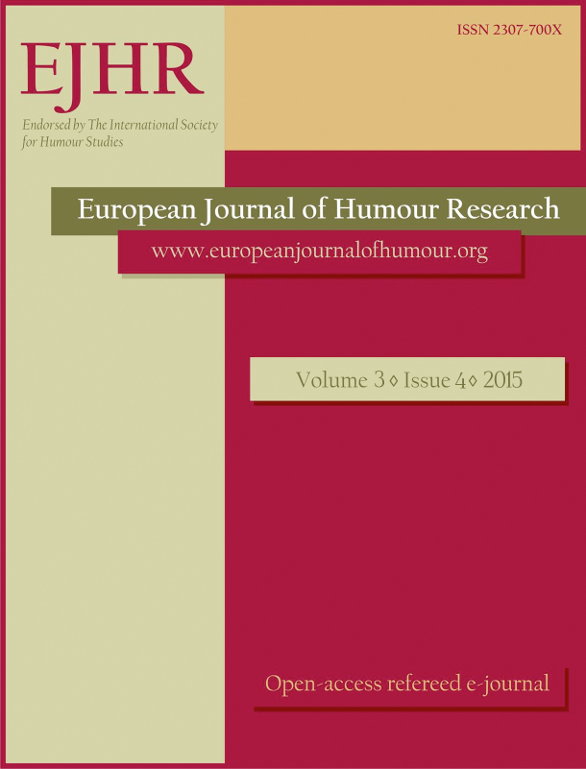
Book review
Chiaro, D. & Baccolini, R. (eds.). (2014). Gender and Humour: Interdisciplinary and International Perspectives. New York: Routledge.
More...We kindly inform you that, as long as the subject affiliation of our 300.000+ articles is in progress, you might get unsufficient or no results on your third level or second level search. In this case, please broaden your search criteria.

Chiaro, D. & Baccolini, R. (eds.). (2014). Gender and Humour: Interdisciplinary and International Perspectives. New York: Routledge.
More...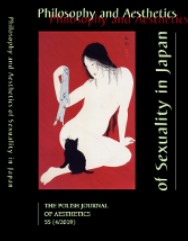
The objectification of women in art and pornography is often seen as harmful. However, Martha Nussbaum’s articulation of seven types of objectification shows how it can be benign or positive depending on the context. This paper utilizes Nussbaum’s ideas to examine the objectification of women depicted in shunga, sexually explicit art created in 17th-19th century Japan, and how it differs from European art of the same period. It also explores related issues of equality, sexuality, and agency.
More...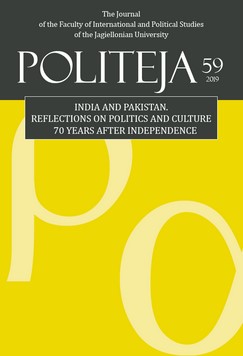
This paper attempts to delineate and focus on the common narrative thread running through subsequent cinematic treatises on the situation of women during the Partition, particularly those kidnapped and sexually violated during the vivisection. It proposes to construct a cultural and memorialized history of the Partition through a reading of mediated representations of literary engagements with the event, particularly the narrativization of the cinematic trope of the ‘radicalized’ Muslim and his involvement in the abduction of “chaste” Hindu women during the cataclysmic event. In doing so it considers films such as 1947-Earth (1999), Pinjar (2003), and Khamosh Pani (2003) as seminal films addressing female abductions during the Partition and the memorialization of trauma through cinema. The paper takes a feminist approach to addressing the question of the possession of the female body as the symbolic occupation of the nation.
More...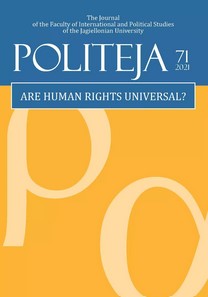
The United States does not comply with the International Convention on the Elimination of All Forms of Racial Discrimination (ICERD), which is the United Nations’ core binding anti-racism human rights convention. One hundred and seventy seven states, including the US, have ratified the anti-racism multilateral agreement. The nation entered into the pact in 1994 yet still has not implemented its obligations to the statute. This study focuses on the protections ICERD provides Latino immigrants who are not United States citizens as this group is often ignored in advocacy for implementation strategies. Areas where the United States does not comply with ICERD include discriminatory immigration policies and practices, violent and discriminatory policing, gendered violence, and inequalities in the criminal justice system. It is critical to examine ICERD’s protections for Latino non-citizens because it reveals how the group experiences racism differently than other people because they endure intersectional forms of systematic and institutional discrimination due to their race, ethnicity, citizenship status, gender, and other identity traits. Methodologies used in this study include analysis of ICERD’s monitoring body’s General Recommendations, and the monitoring body’s reports about the United States’ lack of compliance with the statute. These are the most powerful regulatory forces of the treaty due to the monitoring body’s positionality as experts about the pact appointed through the United Nations system.
More...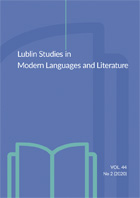
The paper analyzes a recent experiment in the collaborative production of ethnographic knowledge and the use of the graphic novel form as an alternative to the conventional academic monograph. Lissa: A Story about Medical Promise, Friendship, and Revolution (2017) is discussed here as a useful tool in the age of globalization for building recognition of the need to protect the lives of people other than our immediate kin, tribe, race, or nation. The paper argues that both the collaborative research behind the story and the formal experimentation stem from the authors’ sense of accountability to their informants. By telling a story about distant others who are given names and faces, Lissa’s authors encourage readers to develop empathy across borders.
More...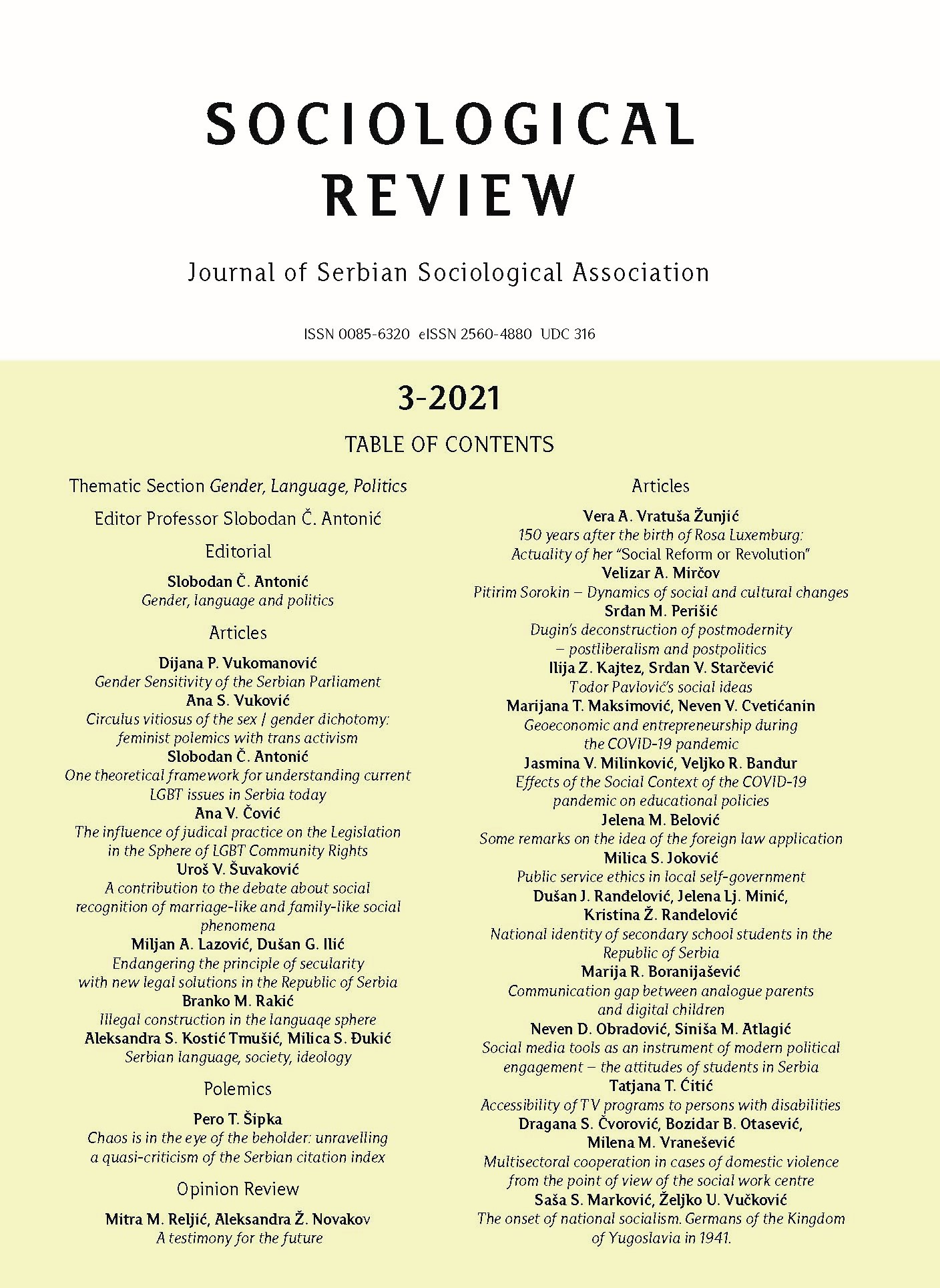
In the light of the announced adoption of the Law on Same-Sex Unions, the question arises whether the draft law is in accordance with the Constitution, especially after the announcements that the law will not be signed. Although the Constitution specifies that marriage is a union of a man and a woman, experts point out that in this case it is not a law on marriage and family, nor does it provide for the possibility of adoption of children by same-sex couples, but that it regulates property, health, pension and other legal relationships of same-sex partners living in the union. At the same time, many public figures have invited traditional religious communities to react in order to defend the “right to freedom and future of the people”, emphasizing that contentious issues related to the regulation of mutual rights and obligations of same-sex couples could be resolved by amending the existing laws in those areas. In the countries where similar laws exist, case law has played a significant role, just as various medical and psychological associations. The European case law is not uniform, and cases often end before the European Court of Human Rights, while in the United States at the federal level, all anti-homosexual laws are repealed by a Supreme Court decision (Lawrence v. Texas, 539 U.S. 558 [2003]). Nevertheless, there is no single law in this area and the rights of same-sex couples vary from country to country. The paper will provide an overview of significant court decisions in this area in European countries, as well as the decisions of the US Supreme Court, which may lead us to think about the possible legal consequences of (non)adoption of the disputed Law on Same-Sex Unions, about procedures that could be initiated if partners decided to request judicial protection for the purpose of recognizing their guaranteed human rights, as well as the content and significance of such court judgments.
More...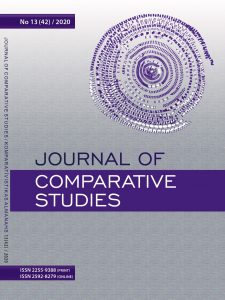
Thousands of Latin American women disappear on daily basis. The United Nations through the Women Unit classifies Mexico as an emergency State, and Brazil as an alarming country in terms of violence and murder against women and little girls. However, the key question is to analyse the tolerance toward violence and subjugation of women in Mexico and Brazil. The hypothesis of this work is based on the idea that violence against women in Mexico and Brazil is due to prevalent machismo in those countries, which is influenced by the political, social, economic and cultural structure. The present text aims to understand how machismo is embodied into Mexican and Brazilian culture, reflected into family and social structures and values, as well as inside the political establishment, which contributes not only to subjugating women, but also to increasing gender violence in these countries, where corruption and impunity are also critical. The text is based on an interdisciplinary perspective, with ethnographic data extracted by direct interviews conducted in the communities of Xochimilco, South of Mexico City, Mexico. The article exposes the main perspectives about machismo, offers a cultural description of family values and social tolerance towards machismo, provides a general picture about the levels of gender violence in Mexico and Brazil, and presents the role of political establishment in the development of machismo, and finally it offers some conclusive comments.
More...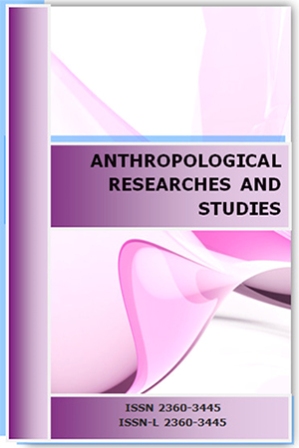
Objectives. The aim of this study was to review the most important factors influencing women's involvement in drug trafficking. Material and methods. A systematic search of literature was carried out using Web of Science, Academic Search Complete, ProQuest Central, PsychInfo. The inclusion criteria were met by fifty- two studies. In order to facilitate the understanding of the behavior of women who commit this crime, factor analysis was grouped into social-cultural, personal and psychological factors. Results. The main social and cultural factors considered were the adopted political system, the racial element, the cultural-regional peculiarities, the geographical positioning, the socio-economic status and the sociofamilial environment. The personal factors identified were age, occupation, lifestyle, system of norms and values, and psychological ones referred to indicators of psychological disorders, addictive behavior, the ability to control reactions and the perceived level of self-efficacy. Conclusions. The factors with the highest share of drug trafficking among women were group membership, economic and social status, educational level of parents and friends, prison history and drug use. If in the rural area the main factor that determines women to get involved in drug trafficking is the lack of a job and a low level of education, in the urban area, the influence of the group is significant. Regarding the reasons behind the involvement of women in such criminal acts or in the manifestation of addictive behaviors, these are often compensatory mechanisms, adopted in the absence of effective coping strategies.
More...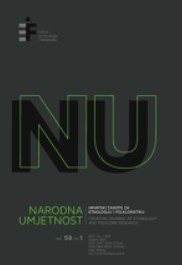
Review of: Dejan Ajdačić - Ljiljana Marks, Zagreb u pričama i predajama. A sad je li to istina ili nije, ja to ne znam, Hrvatska sveučilišna naklada, Institut za etnologiju i folkloristiku, Zagreb 2020., 445 str. Davor Nikolić - Vilko Endstrasser, Mali oblici. Promišljanje žanra, Institut za etnologiju i folkloristiku, Zagreb 2020., 256 str Irena Miholić - Lidija Bajuk, Međimurska popevka, Ljevak, Zagreb 2020., 391 str. Tanja Halužan - Miroslava Hadžihusejnović Valašek, Tradicijske crkvene pučke pjesme na području Požeške biskupije, Požeška biskupija, Požega 2020., 295 str. Tanja Halužan - Miroslava Hadžihusejnović Valašek, Hvatajte se u pleteno kolo. Tradicijska glazba Virovitičko-podravske županije, Ogranak Matice hrvatske u Slatini, Slatina 2020., 371 str. Tanja Halužan - Miroslava Hadžihusejnović Valašek, Hodi k meni, puče dragi. Hrvatske duhovne pjesme franjevačkih rukopisnih kantuala prve polovice 18. stoljeća u Slavoniji i Srijemu, Hrvatska franjevačka provincija sv. Ćirila i Metoda, Zagreb 2019., 223 str. Ljiljana Pešikan-Ljuštanović - Lidija Delić, Zmija, a srpska. Konceptualizacija u usmenom folkloru, Andrićev institut, Andrićgrad, Višegrad 2019., 396 str. Lidija Delić - Jelenka Pandurević, Folklorni erotikon. Erotika i poetika srpskih narodnih pesama, Andrićev institut, Višegrad 2020., 163 str. Dubravka Zima - Plameni inkvizitori. Feminizam i kultura straha, ur. Lada Čale Feldman, Anita Dremel, Lidija Dujić, Maša Grdešić i Renata Jambrešić Kirin, Centar za ženske studije, Institut za etnologiju i folkloristiku, Zagreb 2019., 180 str. Martina Petranović - Devedesete. Kratki rezovi, ur. Orlanda Obad i Petar Bagarić, Institut za etnologiju i folkloristiku, Jesenski i Turk, Zagreb 2020., 427 str. Ewa Wróblewska-Trochimiuk - Osamdesete! Slatka dekadencija postmoderne, eds. Branko Kostelnik and Feđa Vukić, Hrvatsko društvo likovnih umjetnika, Društvo za istraživanje popularne kulture, Zagreb 2015, pp 344. Antonija Zaradija Kiš - Marinko Tomasović, Urezani i uklesani simboli na arhitekturi Makarske i njenog rubnog područja, Gradski muzej Makarska, Makarska 2019., 128 str. Jasna Čapo - Mila Dragojević, Identiteti u ratu. Civilne žrtve u komparativnoj perspektivi, Srednja Europa, Zagreb 2020., 195 str. Jelena Seferović - Križo Katinić, Sve su minute bitne. Antropološko-psihoterapijski pristup smrti, Jesenski i Turk, Zagreb 2020., 101 str. Nada Kujundžić - Claudia Schwabe, Craving Supernatural Creatures. German Fairy-Tale Figures in American Pop Culture, Wayne State University Press, Detroit 2019., 344 str. Bruno Robert Kirinić - Ukrajina i Hrvatska. Povijesne paralele. Radovi Drugog međunarodnog hrvatsko-ukrajinskog znanstvenog skupa, ur. Ljubomyr Sikora i Jevgen (Jevgenij) Paščenko, Etnološko društvo Bojky, Drogobyč 2019., 447 str. Ana Antolković - Digitalni alati za istraživače: DARIAH ELDAH Consent Form Wizard (CFW) i portal SSHOpen Marketplace
More...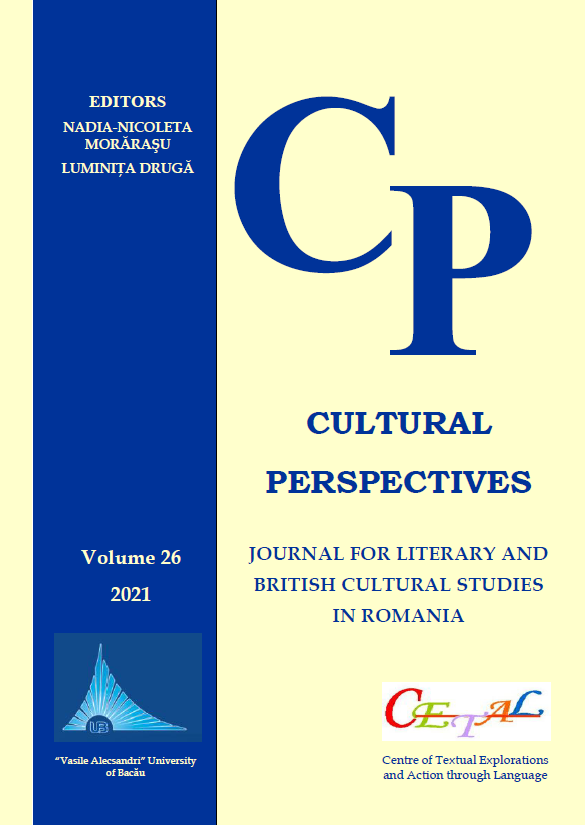
The progress of any society, be it modern or traditional, entails and depends on mentalities, derived from stereotypes and prejudices formed over time and transmitted from one generation to another. Of these, the most commonly used are those about the role and place of women and men in society. For Romanians, the nineteenth century was a century of "lights" because, beyond their liberation from foreign rule (Phanariot, then Ottoman), it was the time when an extensive process of "enlightenment" of the people began, including the gastronomic field. Supported by the theoretical framework on gender provided by Kelly, Bayes et al. (2004) and Gordon (1993), our paper aims at illustrating the factors that contributed to the resistance of traditional perceptions on the gender-based division of domestic labour. The survey conducted in this study highlights the major changes that have taken place in Romanian society, from the 19th century to the present, in order to account for the evolution of the housewife to the lady chef or chef. The sociolinguistic perspective will be based on a corpus of texts, namely prefaces of some cookbooks as "useful books" for Romanian domestic economy, published in the 19th and 20th centuries, and on information extracted from online and contemporary media, to the purpose of highlighting the major changes that have taken place in Romanian society, from the housewife to the lady chef or chef.
More...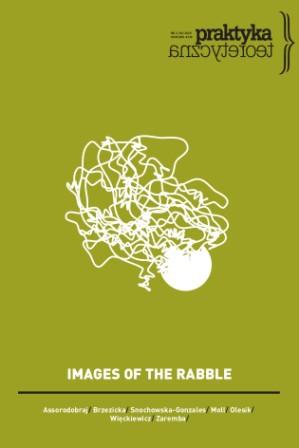
The author interprets the figures of European workers and colonized Africans presented as slaves of capitalism and imperialism, the image that circulated in the social and cultural imagination in Germany after the Berlin Conference (1884-1885). The aim of the article is to introduce the concept of “counterimagination” and show how the image of the rabble became juxtaposed with a visualization of the black slave. The author argues that both figures were considered to be a real threat to the German social order and to German Kultur, and concentrates on the popular images of the “other” circulating in the German visual culture after 1880. The first part of the article is devoted to the aesthetics of the weekly satirical magazine Simplicissimus founded in April 1896. In the second part, the aggressive propaganda campaign against the Occupation of the Rhineland by French colonial troops is discussed. The author describes the mechanisms of envisioning black soldiers and points out the anticolonial reactions to the “Black Shame” campaign.
More...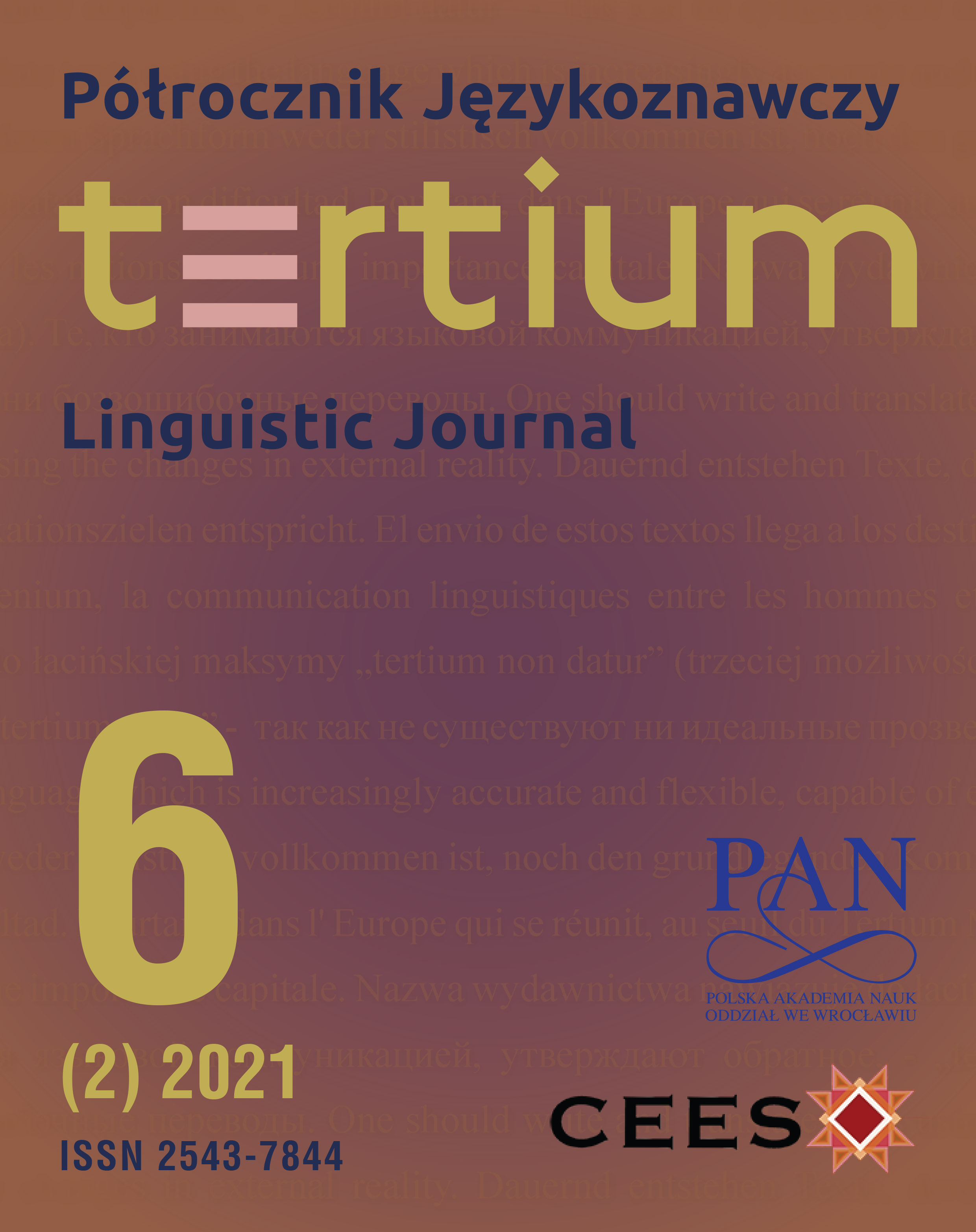
A Corpus Study
The paper addresses issues related to language and gender, and discusses research on the frequency of adjectives in language of male and female characters in a TV drama series “Homeland”. The empirical part of the study uses as its theoretical background the classic works in the field (Lakoff 1975; Butler 1990; Meyerhoff 2006), which identify gender specific language features and define factors that determine male-female language differences. The research was conducted manually, with a limited support of electronic tools, on a personally created language corpus consisting of dialogue lines from the TV show. The results clearly show that the frequency of adjectives in female speech in the context of the TV series is higher than in male speech in the analyzed corpus.
More...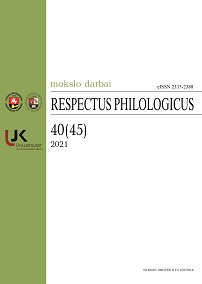
In interwar and post-war societies, men were required to show endurance, courage, and emotional stability, but their traumas, caused by the experience of war and the economic, political, and social realities of the post-war period, are just started to be analysed. Algirdas Jeronimas Landsbergis (1924–2004), a playwright, prose writer, editor, literary and theatre critic of the Lithuanian diaspora, conveys these themes in his work. The images of masculinity revealed in the texts help clarify the general experience of the society hidden in the works and understand what kind of masculinity prevailed in society after the world wars changed the lives of women and men. Using K. G. Jung’s theory of analytical psychology, the article analyses A. Landsbergis’ short stories, which literature researchers less studied. Texts are explored as reflections and shapers of society, and in the case of masculinity, it is discussed what is meant by the archetypes of masculinity recorded in the literature. Based on the work of R. L. Moore and D. Gillette and J. C. Campbell, the archetypes of the divine child, the child prodigy, the Oedipus child and the hero and mature masculinity – the king, warrior, magician and lover are distinguished.
More...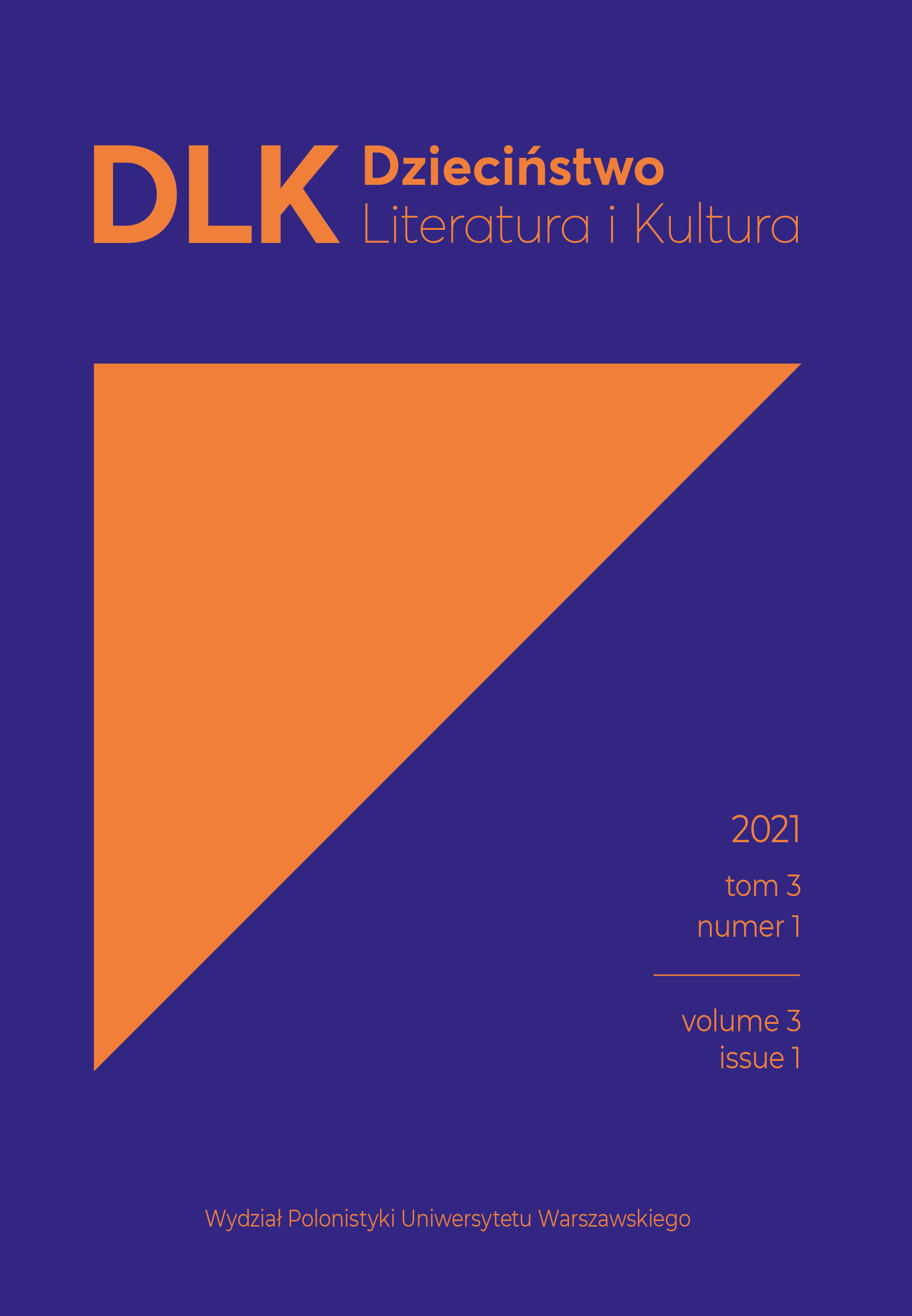
The article presents the genesis of the LGBT young adult literature and its development in the United States from the late 1960s to the present times and in Poland after 1989. The author lists the most important titles of this genre variant. The representation of non-heterosexual and transgender people in novels for young adults has been noticeable since the 20th century. The number of LGBT books on the American publishing market grows every year, while in Polish young adult books, non-heterosexual orientation or transgenderism are still rarely mentioned topics. In the final part of the article, the author explains why more LGBT-themed novels for young people should be written.
More...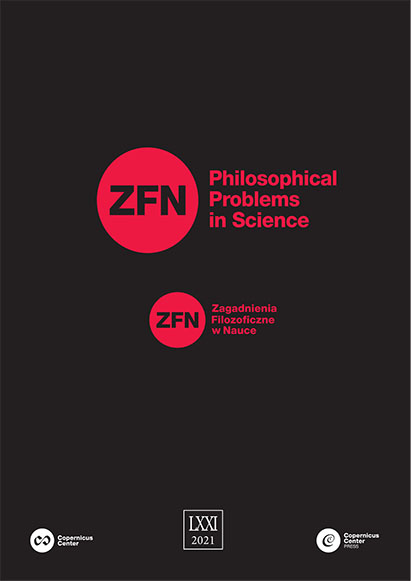
Evolutionary psychology offers a fairly ‘patriarchal’ picture of sex differences, according to which men are, ‘by nature’, (a) much more polygamously disposed, (b) much more desirous of power over the opposite sex (this desire manifests itself in their more intense sexual jealousy), and (c) much more aggressive than women. However, the picture—at least in its components (a) and (b)—becomes problematic if one looks at the history of conceptions of paternity accepted by our ancestors. It is argued in the paper that the very fact that our ancestors accepted various and essentially different conceptions of paternity casts a shadow of doubt on the ‘patriarchal’ picture of sex differences (especially if this fact is coupled with the hypothesis that our most distant-Pleistocene-ancestors accepted the conceptions which deny or marginalize the role of father in the process of the generation of children).
More...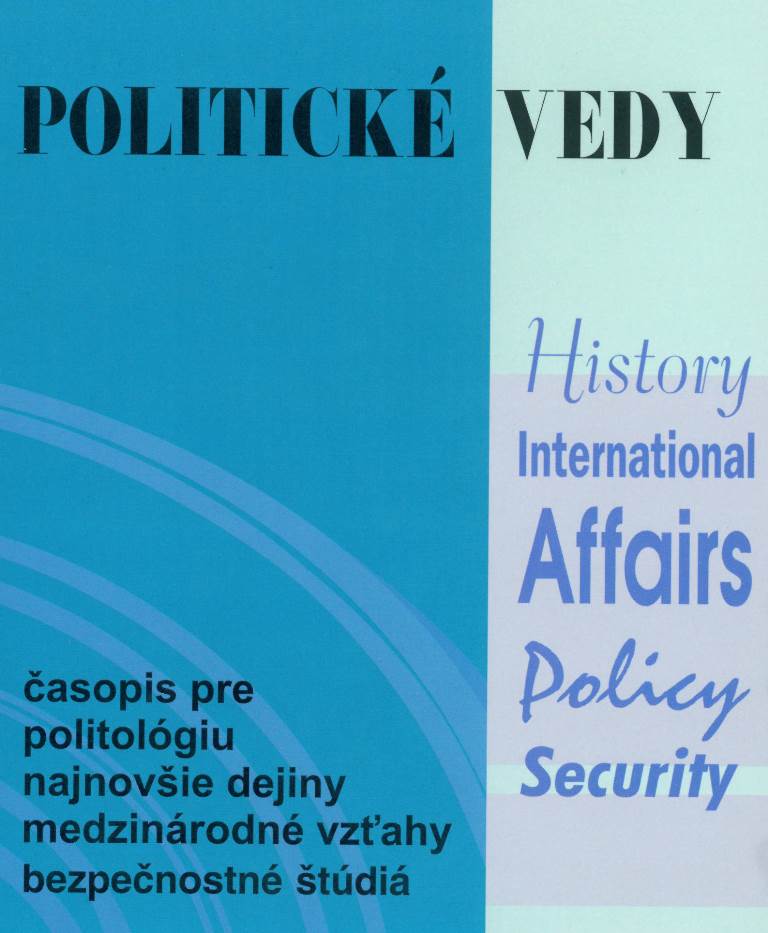
Recent years have seen a rise in prominence – at both national and European levels – of anti-gender movements and parties. While actors using this rhetoric can be found across most EU member states, anti-gender rhetoric represents government policy in a few East-Central European countries, bringing these objections to the European level. In this article, we analyse and interpret this ECE-led state opposition to ‘gender’ by examining the diversification of the meaning of this term at EU level, including a shift from a structural to an individualist one, which we argue lends empirical credibility to the anti-gender rhetoric of right-wing populist parties. Based on interviews with EU stakeholders in the European Commission, European Parliament and EU-level civil society, as well as on the analysis of European Commission documents and Council Conclusions, we track the use of the term ‘gender’ and the definition which has been attached to it. We conclude that these changes result at least in part from feminist taboos and neoliberal tendencies within feminist theory arriving to the EU polity. We believe that the shifts around the concept of gender on the progressive side shed light on the popularity of the anti-gender discourse and of the right-wing itself.
More...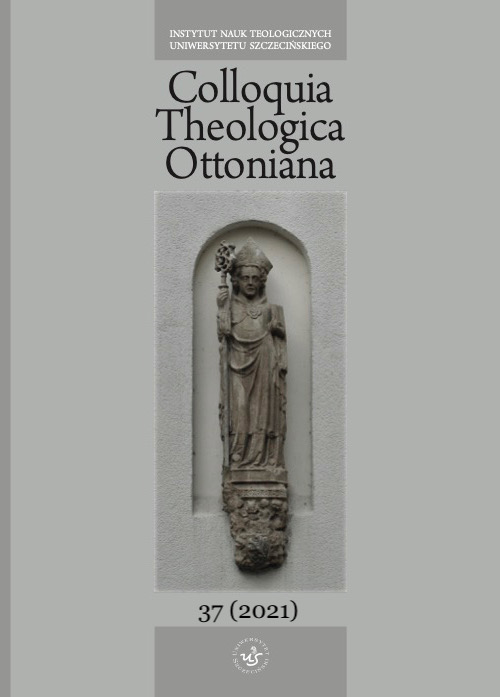
The main purpose of this article is to analyse the medial discourse connected with new ways of presenting religious symbols and social reactions to this. Religious symbols are used by communities that want to stand out in society. The research questions consider whether these events, treated by Catholics as scandalous and offensive, could be examples of a new form of hate speech in the Polish public sphere. If so, this would involve an evolution from the language sphere to the visual sphere and, therefore, would be a crucial shift in a cultural war in our society. The diagnosis of phenomena related to events perceived as “provocations” indicates that we are dealing with a new social problem. This problem involves people associated with the Catholic Church, the police, the court, and the prosecutor’s office because the authors of initiatives are accused of offending religious feelings, which, according to Art. 196 of the Criminal Code is a crime in Poland.
More...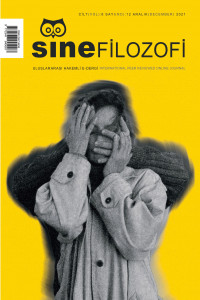
This article is going to discuss and compare two film adaptations of William Shakespeare’s classical drama The Tempest (1611). The Tempest (Fırtına, Julie Taymor, 2010) and The Tempest (Fırtına, Derek Jarman, 1979) are considered as two peculiar representations, specifically rewriting gender, race, and power issues the original text dealt with. The Tempest (1611) was chosen for this study because of its uniqueness in Western Drama in terms of mythology, ancient Greek Drama, Latin Drama, Romance, Neoclassicism, and Symbolism, as well as its discussion of modern and universal issues such as gender, race, and power. The time Shakespeare wrote this play coincided with the beginning of English colonialism. In general, it rallies with the classical approaches of tragedy and comedy through combining their elements. The Tempest may be regarded as the initiation of the postcolonial drama. The adaptation of this play for film and theater has been a long process. In our study, film adaptations of Derek Jarman (1979) and Julie Taymor (2010) will be discussed and compared in terms of postmodern film features. The reason for choosing these two films is that both films deal with the same story from two different perspectives of sexual identitiy as queer and feminist. As a result of the findings obtained at the end of the study, it is determined that Shakespeare’s play The Tempest contains themes that center postmodernism and therefore it is a postmodern play. It has been concluded that The Tempest, as a text that can be rewritten in accordance with the socio-cultural position and stance in the historical context, can appeal to the present with its themes and narrative, and that it can be adapted into a postmodern film with its timelessness. While Shakespeare’s The Tempest was rewritten with a queer look in Derek Jarman’s 1979 adaptation, it was seen that the text was rewritten with a feminist discourse and narrative in Julie Taymor’s adaptation.
More...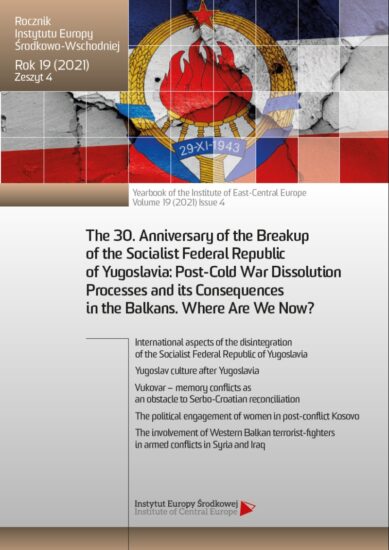
The Republic of Kosovo was created several years after the breakup of the Socialist Federal Republic of Yugoslavia. Its problems were visible during Josip Broz Tito’s presidency. Over the last ten years Kosovo has had two female presidents. The question is, what is the position of women on the Kosovan political scene? This phenomenon is particularly significant from the point of view of the post-conflict reconstruction of the state. The aim of this article is to analyse the evolution of the role of Kosovo Albanian women in the politics of Kosovo at the central level. For this reason, the article includes women involved in the armed conflict in Kosovo, especially in the activities of the Kosovo Liberation Army (KLA, alb. Ushtria Çlirimtare e Kosovës, UÇK). The author also presents the role of women in the Kosovan political arena since 1999, with particular emphasis on changes that took place after the declaration of independence of Kosovo. Furthermore, the author examines the profiles of selected female politicians. The article is based on an analysis of primary and secondary sources, the comparative and historical method, and an analysis of statistical data.
More...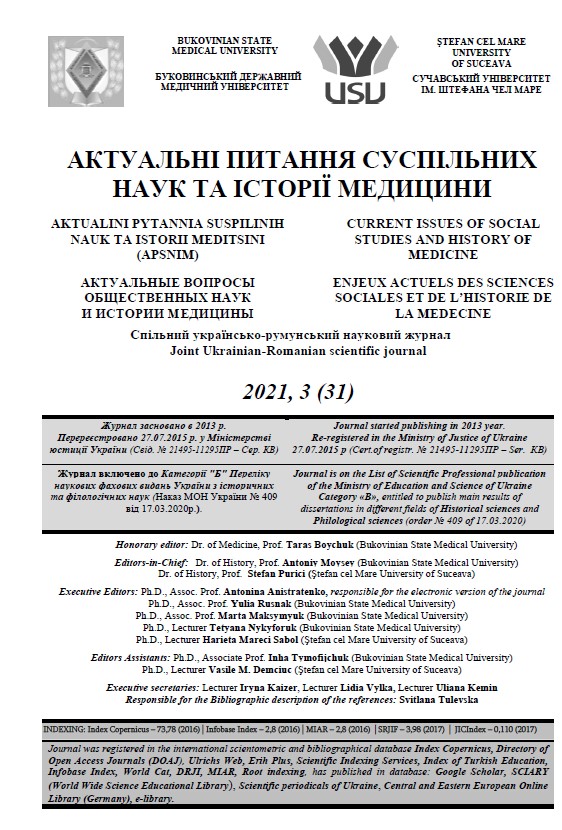
Review of: Daniela Chinde Marian - CARMEN DĂRĂBUȘ: LITERATURE, ETHNIC GROUPS AND HISTORICAL-CULTURAL CONTEXT (CASE STUDIES), LAP LAMBERT, ACADEMIC PUBLISHING, BERLIN, 2021, 222 Р. Daniela CHINDE MARIAN, Technical University of Cluj-Napoca (Romania)
More...